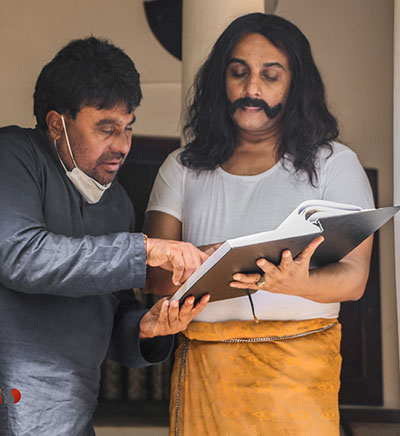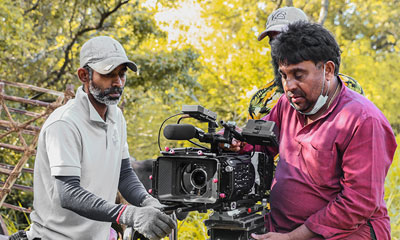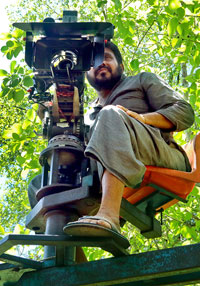‘Teledrama on a reverse journey,’ Sudath Rohana
 Renowned teledrama director Sudath Rohana has directed a number of teleplays with artistic quality and many of them have become award winners. Well-known for his critically acclaimed tele directions like ‘Wana Wadule Wasanthaya’, Beddde Gedara, ‘Karuwala Gedara’, ‘Swayanjatha’, ‘Uthuwankande Saradiel’, ‘Girikula’ and ‘Vikumsiha Kathandara’ a series of teleplays based on Martin Wickremesinghe’s short stories, Sudath’s teledramas have been nominated for many awards and he has won the Best Director award on several occasions. Started as an assistant to the late filmmaker Tissa Abeysekera in his iconic film ‘Viragaya’ (1976), Sudath entered cinema with his script and direction ‘Sudu Kaluwara’ in 2003.
Renowned teledrama director Sudath Rohana has directed a number of teleplays with artistic quality and many of them have become award winners. Well-known for his critically acclaimed tele directions like ‘Wana Wadule Wasanthaya’, Beddde Gedara, ‘Karuwala Gedara’, ‘Swayanjatha’, ‘Uthuwankande Saradiel’, ‘Girikula’ and ‘Vikumsiha Kathandara’ a series of teleplays based on Martin Wickremesinghe’s short stories, Sudath’s teledramas have been nominated for many awards and he has won the Best Director award on several occasions. Started as an assistant to the late filmmaker Tissa Abeysekera in his iconic film ‘Viragaya’ (1976), Sudath entered cinema with his script and direction ‘Sudu Kaluwara’ in 2003.
Having appointed as the chairman of the Independent Television Network (ITN), Sudath shared his views with Sunday Times on the present situation in the teledrama industry and country’s television medium.
“I feel compared to the past, the teledrama is on a reverse journey. Starting with D. B. Nihalsinghe’s ‘Dimuthi Muthu’, the Sinhala drama is not on a progressive journey. Actually the first teledrama produced in the country was a Tamil production. It was then only “Dimuthi Muthu” was produced. Even though technology was not advanced, I still believe the quality wise those teledramas were far ahead to some of the production we see today. Those teledramas were able to create a social discussion with the viewers and the audience,” said Sudath who is keen to promote art, culture and literature through his direction.
“If you take ‘Palingu Menike’ one of the popular teledramas made during the early days it was a simple story but the subject it discussed had lot of relevance and depth. It discussed how the society would turn upside down with the open economy introduced to the country in 1977. The script writer Somaweera Senanayake and director Dhamma Jagoda were able to foresee what was going to happen. Sri Lanka’s teledrama journey started like that had impressive junctures with directors like Dharmasena Pathiraja, Jayantha Chandrasiri, Bertram Nihal, Sudath Devapriya and many more. They saw the teledrama as a form of art. Towards the end of 19th century we saw a positive and progressive trend in the teledrama industry. These teledramas had a vision. But if you take today we see the completely different situation. That is why I say we are on a back word trend,” Sudath explained.
 Sudath criticised the decision to allow foreign soap operas on television which had lot of negative impact.
Sudath criticised the decision to allow foreign soap operas on television which had lot of negative impact.
“The influence of the foreign imported teledramas also affected local teledrama industry. We also saw how some of these soap operas imported to Sri Lanka and dubbed to Sinhala had lot of negative effects on TV audience in Sri Lanka. There were many wrong morals and values like extra marital affairs and other vices that were justified. On the other hand those who wanted to promote quality teledramas had to stop their production and they even left the industry. Influenced by the low quality foreign dramas, later Sri Lanka started to produce teledramas with similar standards. With this we saw low quality and artistically poor teledramas which were similar to foreign dramas were produced here as well. Later we had to fight against them as well,” Sudath who is struggling to maintain the artistic quality of the teledrama medium said.
Describing another reason for low quality in the teledrama, Sudath says when the costs of other products and services were increased; the price of the teledramas remained the same. Instead of an art form teledrama became a business. “When I did ‘Vikumsiha Kathandara’ based on Martin Wickremesinghe’s short stories, I had to have at least three days for one episode but we see today two episodes are made within one day.
The experienced teledrama director also views that some of the private television channels were responsible for the downfall of teledrama industry.
“Some of the private TV channels were responsible for producing low quality teledramas. They just limited this medium to a mode of entertainment. It was one of the major blows to this art form,” he argues.
 “There are many private channels which aim only to make money. So there is a strong need to introduce a monitoring body for teledramas. There is Public Performance Board (PPB) or Censor Board for films to examine whether they are suitable for public screening and if so on what category they should be screened. We then be able to know whether it is suitable for children or not. The teledrama or TV didn’t come under the PPB because there was no TV at the time when PPB was introduced. And many view PPB as a cultural police but I don’t think so. It is necessary that some standards be maintained. In one of the foreign teledramas I saw a female teacher comes to the classroom after consuming liquor. This is not suitable for our culture,” Sudath stressed.
“There are many private channels which aim only to make money. So there is a strong need to introduce a monitoring body for teledramas. There is Public Performance Board (PPB) or Censor Board for films to examine whether they are suitable for public screening and if so on what category they should be screened. We then be able to know whether it is suitable for children or not. The teledrama or TV didn’t come under the PPB because there was no TV at the time when PPB was introduced. And many view PPB as a cultural police but I don’t think so. It is necessary that some standards be maintained. In one of the foreign teledramas I saw a female teacher comes to the classroom after consuming liquor. This is not suitable for our culture,” Sudath stressed.
“For a day there are about 5 to 8 teledramas and if there are ten channels there are about 80 teledramas per day. Even if we take 50 teledramas we see that they drop on our living rooms products that have never been monitored by anyone else. This is very dangerous. Compared to cinema the number of television viewers are high and it is said the number is nearly15 million per night. I don’t think a film is being viewed by that amount of viewers during its entire screening period. There is a strong need for a monitoring body for teledramas. I know that many teledrama directors would not like this and channel owners would not like it but I think it is a necessity,” he said.
For years Sudath Rohana fought to have a clear screen, free from disturbing advertisements for teledrama viewer. “I strongly believe that the audience should have ‘viewing freedom’. While a sensitive scene is telecast a screen was disturbed by popping up advertisements. As soon as I was appointed as the Chairman of the ITN I stopped this trend,”
“It is a right of the viewer to have free screen at least during the times of teledramas,” Sudath said.
He also said the ITN channel which was branded as government’s mouthpiece has given considerable space for opposition political parties and he also has introduced a primetime teledrama belt at 8 pm dedicated for artistically quality old teledramas and new production as well.


Searching for that next furry family member but couldn’t find one in your area? Hitad.lk has the solution with our extensive listings of dogs for sale in Sri Lanka!


